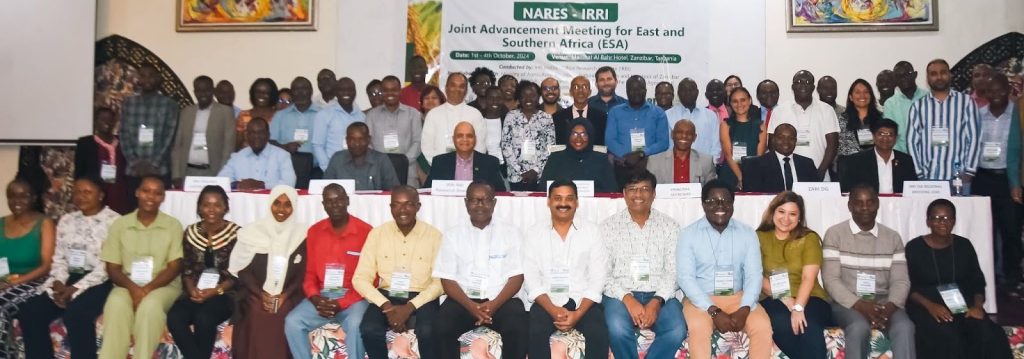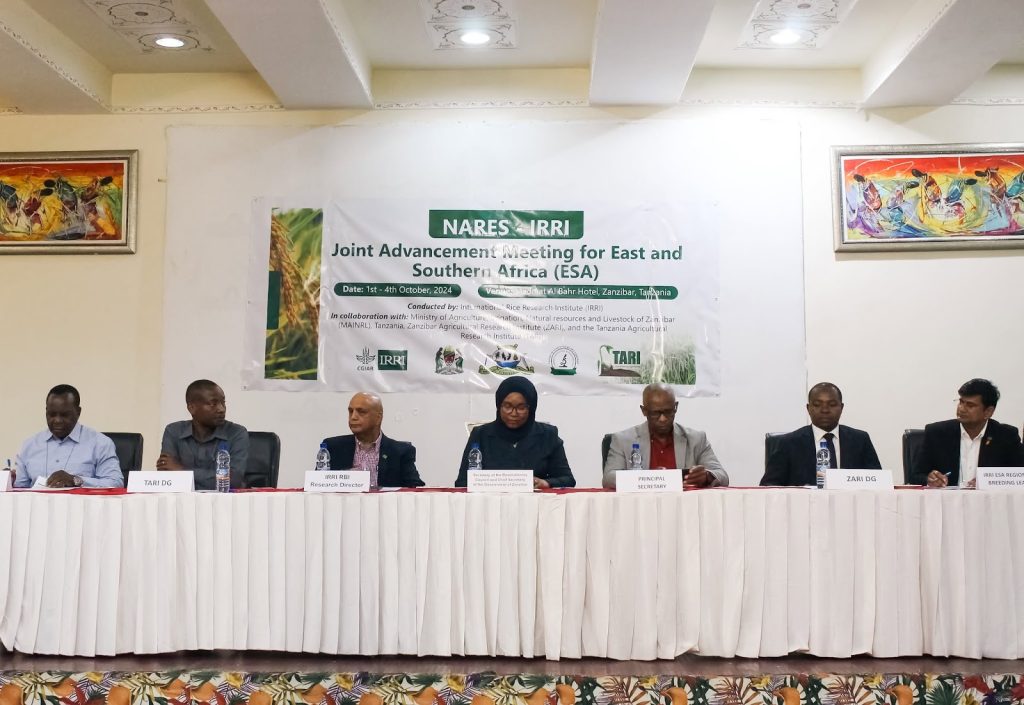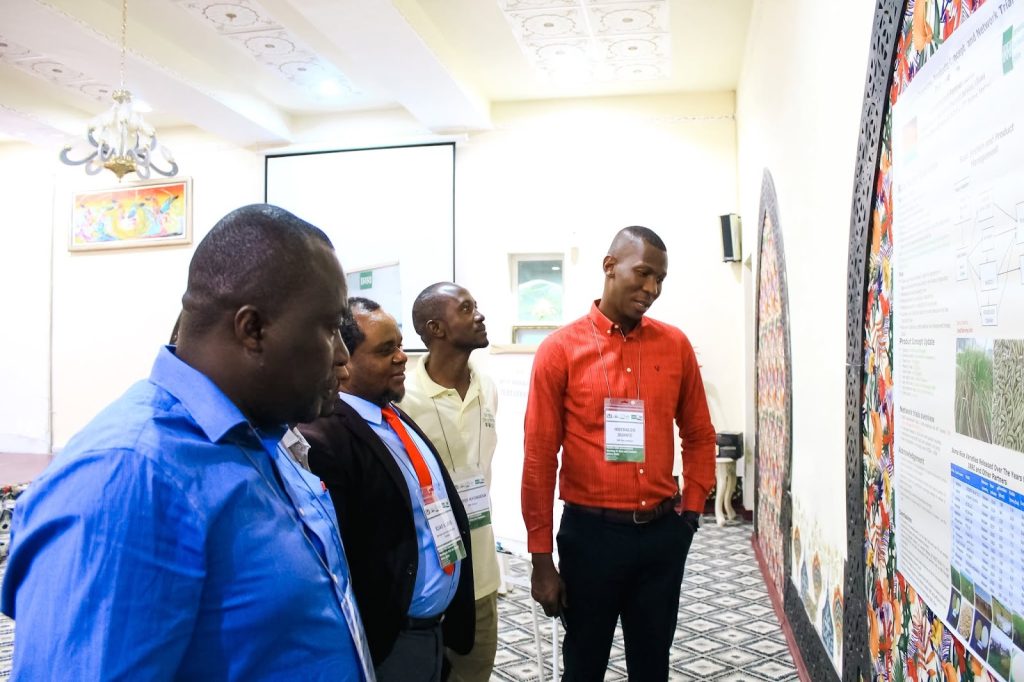Tags
NARES and IRRI advance market-driven varieties and accelerate adoption of new rice varieties in Africa
International Rice Research Institute (IRRI).

ZANZIBAR, Tanzania, 4 October 2024 – The 2024 NARES-IRRI Joint Advancement Meeting in Zanzibar, Tanzania, reaffirmed a shared commitment to tackling food security challenges in East and Southern Africa (ESA). Hosted by the Zanzibar Agricultural Research Institute (ZARI), the Tanzania Agricultural Research Institute (TARI), and the International Rice Research Institute (IRRI), the meeting served as a platform to assess progress, exchange insights, and develop actionable strategies to enhance rice breeding lines and seed systems in the region. By aligning research with market demands and local farming conditions, governments, NARES, and IRRI aim to fast-track the adoption of improved rice varieties—ensuring higher yields, superior grain quality, and greater resilience to climate challenges.
In her inaugural address, Honorable Zena Ahmed Said, Chief Secretary of the Revolutionary Government of Zanzibar, emphasized the importance of collaboration among the government, the agricultural community, IRRI, NARES, and their partners. She highlighted how these partnerships have enabled Zanzibar to benefit from high-yielding, climate-resilient rice varieties and advancements in agricultural practices.
“This platform provides us with an excellent opportunity to deepen our collaboration, strengthen our partnerships, and chart a path forward for the future of rice production in East and Southern Africa,” she stated.
She also assured participants of the government’s ongoing commitment to agricultural research, farmer support, and climate-smart practices.

Research and Innovation Highlights
Discussions focused on strengthening collaboration to enhance ESA’s agricultural sector, particularly rice production, climate-resilient seed systems, and food security. NARES representatives from key countries—Tanzania, Kenya, Mozambique, Ethiopia, Burundi, the Democratic Republic of Congo, and Uganda—provided updates on country priorities in the rice sector, rice research, breeding efforts, and seed systems. This was followed by a panel on rice cultivation, breeding programs, and trait preferences.
Additionally, NARES partners from Madagascar, Malawi, Zambia, and Zanzibar showcased their respective research and innovations in rice breeding and seed systems through poster presentations.

Challenges and Solutions in Rice Breeding
The meeting explored Africa’s agricultural challenges and opportunities, addressing topics such as climate-smart varieties, Direct Seeded Rice technology, multiple harvest rice, grain quality, and other relevant issues. Special talks covered market segmentation, genetic diversity, and Africa’s rice improvement program, focusing on the 2025-2030 portfolio.
In breakout sessions, the NARES partners, together with IRRI Plant Breeders Dr. Shalabh Dixit, Dr. Suresh Kadaru, and Dr. Waseem Hussain, discussed varieties to be advanced in respective countries and market segments based on data generated by NARES partners. NARES and IRRI scientists reviewed data, identified breeding lines for advancement, and outlined plans for the next season.
The event also focused on training NARES partners in advanced data management and analytics tools like BioFlow and EBS to improve efficiency in varietal development and adoption.
Commitment to Regional Cooperation
Dr. Hans Bhardwaj, former IRRI-Rice Breeding Innovations (RBI) Research Director, highlighted the collaborative aspect of the meeting, stating:
“This effort involves making decisions on product advancement, analyzing data, and selecting the best products for farmers and consumers in the target countries and market segments.”
Dr. Ajay Panchbhai, IRRI’s Regional Breeding, Seed Systems, and Product Management Lead for Africa, reinforced the importance of collaboration, stating:
“Regional collaboration between the countries in Africa is as important as the global collaboration of NARES partners with international organizations such as IRRI, AfricaRice, and CIAT to address challenges in the rice sector in Africa.”
The 2024 NARES-IRRI Joint Advancement Meeting concluded with a call for greater regional cooperation, inclusivity, and investment in climate-resilient agricultural solutions. Mr. Ali Khamis Juma noted:
“Research is the foundation upon which we can build a more productive and sustainable agricultural sector.”
Co-sponsored by AGGRi2 and the CGIAR initiatives on Accelerated Breeding, Breeding Resources, Seed Equal, and Market Intelligence, the meeting engaged over 90 participants from 12 countries, including 25 online attendees. Scientists and experts from IRRI, AfricaRice, and CIAT represented CGIAR in this joint advancement meeting. Additionally, 25 NARES and IRRI regional staff participated in a capacity development training on October 4.
https://www.irri.org/news-and-events/news/nares-and-irri-advance-market-driven-varieties-and-accelerate-adoption-new-ricePublished Date: February 6, 2025






